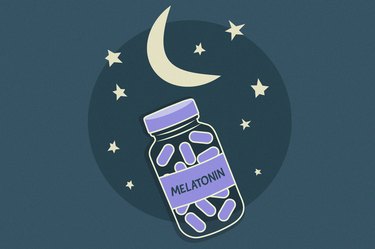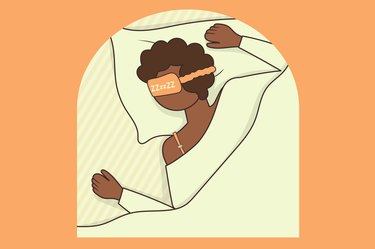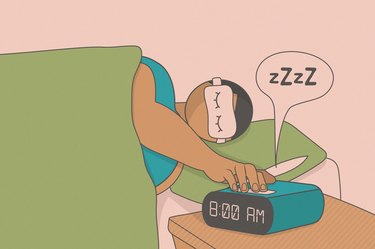
Taking melatonin can help you get through a short stretch of lousy sleep or get better rest when you're jet-lagged. But can you take melatonin every night? Is that safe?
Melatonin is generally safe for short-term use, though for some people, it can cause mild side effects. But it's not recommended for managing chronic or long-term insomnia, according to the National Center for Complementary and Integrative Health (NCCIH).
Video of the Day
Video of the Day
"There's a lack of convincing evidence regarding its effectiveness and safety profile, and it has shown mixed efficacy in trials," says Kunal Kumar, MD, the medical director of the Sleep Center at Einstein Medical Center Philadelphia.
Here's a look at why experts warn against taking melatonin regularly and how to use it safely when you need it.
What Is Melatonin, Anyway?
A quick refresher: Melatonin is a naturally occurring hormone that plays an important role in sleep and other functions in your body, per the NCCIH. Your body ups production of this hormone when it's dark and produces less during the daytime. Because of melatonin's role in regulating sleep-wake cycles, people often supplement with melatonin to get to sleep easier.
What Happens When You Take Melatonin Every Night?
Experts typically recommend taking melatonin for short stretches when you're having trouble sleeping. "It appears to be safe to take melatonin for four to eight weeks," Dr. Kumar says.
But long-term use hasn't been well-studied, so it's hard to say for sure what might happen if you take it for extended periods.
That said, here are some likely possibilities:
1. You Could Become Dependent on It
Melatonin isn't an addictive substance, so you can't actually get hooked on it, according to the Cleveland Clinic. But if you get into the habit of taking melatonin every night, you might start to convince yourself you can't sleep without it.
"Any non-habit forming agent or ritual used routinely for sleep onset may have a psychological basis, as patients may feel dependent upon its usage," says Thomas Yadegar, MD, a pulmonary, critical care and sleep specialist at Providence Cedars-Sinai Tarzana Medical Center in Los Angeles.
2. Your Chronic Sleep Problem May Go Undiagnosed
Melatonin is meant to be a temporary solution for short-term sleep issues. So if it hasn't helped after several weeks, you could actually have a chronic sleep problem that isn't being addressed — like sleep apnea.
"Underlying sleep disorders — particularly when symptoms last longer than three months or impact activities of daily living — should be promptly evaluated by a medical professional," Dr. Yadegar says.
3. You Might Have Chronic Side Effects
Melatonin, though generally considered safe, can cause headache, dizziness, nausea, drowsiness, anxiety, irritability or depression, according to the Mayo Clinic.
If you get hit with these side effects after taking the supplement once or twice, there's a good chance you'll experience them regularly if you take melatonin every night.
4. It Can Mess With Your Medications
Melatonin can interact with a number of prescription medications. For instance, it can increase the risk of bleeding for people who take anticoagulants or antiplatelet drugs, make anti-seizure medications less effective, or alter blood sugar in people taking diabetes medications, per the Mayo Clinic. Over time, that could have a negative effect on your health.
You should talk with your doctor before using melatonin (for short- or long-term use) if you take:
- Anticoagulants or antiplatelet drugs, herbs or supplements
- Anticonvulsants
- Blood pressure medications
- Central nervous system (CNS) depressants
- Diabetes medications
- Hormonal birth control
- Cytochrome P450 1A2 (CYP1A2) and cytochrome P450 2C19 (CPY2C19) substrates
- Fluvoxamine
- Immunosuppressants
- Seizure threshold lowering drugs
How to Take Melatonin Safely
Talk with your doctor before starting any new medication or supplement, including melatonin. Together you can determine if the supplement is the right tool to address your sleep concerns, and if so, how you should be taking it.
Here are a few things to keep in mind when you supplement with melatonin:
1. Start With a Low Dose
"There is no standardized doze for melatonin, yet most patients start at 1 milligram and may require up to 5 milligrams," Dr. Yaeger says.
Consider starting with a supplement that has less than 1 milligram to start, per ConsumerLab. Taking high amounts (between 5 and 10 milligrams) is likely to leave you feeling sleepy and off-kilter the next day.
What's more: April 2023 research in JAMA found that 88 percent of the 25 melatonin gummies analyzed were mislabeled, and some had more than three times the amount of melatonin listed on the label. So if you're taking a large dose, you may be getting even more melatonin than you bargained for.
2. Choose a High-Quality Supplement
Melatonin supplements are not approved by the Food and Drug Administration, so the quality of these products can vary greatly (as seen in the JAMA study above).
To choose a safe and effective supplement, look for a product that has been quality tested by an independent group such as NSF International (or NSF for Sport), Consumer Lab or United States Pharmacopeial Convention (USP). (Products will usually note this on their labels.)
3. Time It Properly
It's best to take melatonin about two hours before you plan to go to bed — using it earlier might leave you drowsy during the day.
4. Watch for Improvement
You should notice a difference in your sleep within a week or two, according to Johns Hopkins Medicine. If it's not helping by then, you should stop taking it. Let your doctor know, too, so you can decide on what to try next to help you sleep.
5. Remember, It's a Temporary Fix
Stop taking melatonin within four to eight weeks, because again, the side effects of long-term use aren't fully understood. If your sleep seems to be back on track, the melatonin did it's job. But if you're still having trouble sleeping, let your doctor know. You may have a chronic sleep problem that needs to be addressed.
Alternatives to Melatonin
If you'd rather not take melatonin, here are some other natural options that can help you get over a short-term sleep problem:
- Exercise: Regular physical activity — either in the morning or afternoon (but not right before bed) — is tied to better sleep and less daytime tiredness, according to Johns Hopkins Medicine.
- Chamomile tea: The herbal tea is rich in flavonoids that may support the brain's transition from being awake to going to sleep, per Johns Hopkins. Plus, warm liquids can be soothing before bed.
- Valerian root: Supplementing with the herb may help some people sleep better, but it can also cause headaches and weakness, per the Mayo Clinic.
- Cognitive behavior therapy for insomnia (CBT-I): CBT-I can teach you how to replace unhelpful thoughts and behaviors around sleep with healthier ones. It's worth considering if lifestyle changes or natural remedies haven't done enough. "It's the best way to treat chronic insomnia and should be considered as a first line of treatment," Dr. Kumar says.
So, How Bad Is It Really to Take Melatonin Every Night?
Popping a melatonin supplement is fine for a few days or a few weeks if you're dealing with jet lag or a short-term stressor that's affecting your sleep quality or leading to you sleeping fewer hours than usual.
But you shouldn't take it for more than a month or two. The long-term effects haven't been well-studied, plus, it could get in the way of addressing a chronic underlying sleep problem.
- National Center for Complementary and Integrative Health: "Melatonin: What You Need To Know"
- Mayo Clinic: "Melatonin"
- Johns Hopkins Medicine: "Melatonin for Sleep: Does It Work?"
- American Academy of Sleep Medicine: "Missing the mark with melatonin: Finding the best treatment for insomnia"
- American Journal of Therapeutics: "Pilot Study of Tart Cherry Juice for the Treatment of Insomnia and Investigation of Mechanisms"
- Mayo Clinic: "Sleep aids: Understand options sold without a prescription"
- ConsumerLab: "Melatonin Supplements Review"
- Cleveland Clinic: "The Truth About Melatonin Addiction"
- JAMA: "Quantity of Melatonin and CBD in Melatonin Gummies Sold in the US"
Is this an emergency? If you are experiencing serious medical symptoms, please see the National Library of Medicine’s list of signs you need emergency medical attention or call 911.






